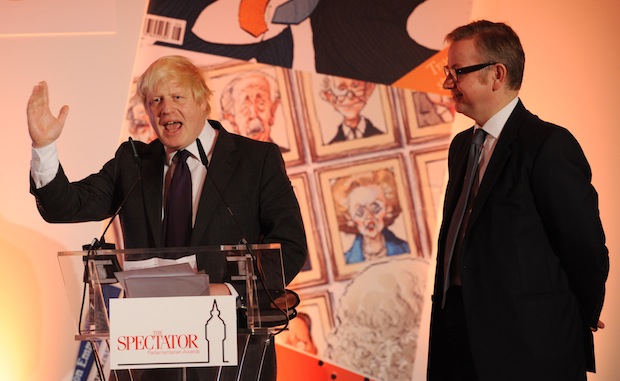Michael Gove and Boris Johnson: partners in power?
written for The Spectator, 30 November 2013

Boris Johnson and Michael Gove at last year’s Spectator awards. Picture: PA
Boris Johnson’s speech at the Centre for Policy Studies, much misrepresented, is still grabbing headlines. Boris gave the Margaret Thatcher memorial lecture, so it’s no surprise it has been interpreted as a bid to succeed her. But another relationship is just as intriguing: was Boris also stealing Michael Gove’s clothes? The Mayor said much about the significance of the Conservatives’ past, but the Govian aspects of his speech offer a glimpse of what the party’s immediate future might look like, particularly when it comes to a future leadership contest.
Boris’ ‘cornflake packet’ argument about meritocracy is a classic piece of Govian thinking. Posing the question ‘what would Maggie do?’, Boris said ‘I hope she would find a way to use [selective schools] to help bright children everywhere to overcome their background’. This shouldn’t be a surprise coming from a Conservative: the left fetishizes working class culture, the right sees it as something for the bright to escape – as Gove himself has done.
And the real reason for the left’s outrage is not Boris’ proposition that we should privilege intelligence. It’s that the left believes there is no ‘top of the cornflakes packet’. Or shouldn’t be. That we should live in a society where the CEO of Tesco has made it just as much as the under-employed yoga teacher in Skegness. There are advantages to this approach: in life, it is soulless to value only financial success, and in government such narrow priorities exclude sectors that both Gove and Johnson profess to value, such as academia and the arts. But even academics and artists establish their own hierarchies. When we claim that a Cambridge Regius Professor should have no greater influence than any other lecturer, we discourage excellence.
As for Boris’ references to IQ, they echo a paper by Gove’s recently departed special adviser Dominic Cummings, which examined the correlation between IQ and performance in school. Cummings was writing in a private capacity, has left Gove’s office and didn’t take nearly as deterministic a position as his detractors presented, but his concern with unlocking the potential of the highly intelligent, regardless of background, says a great deal about the meritocratic ethos of Gove’s team. As Gove himself told last year’s Spectator awards, his passion for meritocracy drives everything he does.
So it would have been difficult not to think of Gove here, even if Boris hadn’t continued, ‘I feel sure that she would direct a beam of maternal and terrifying devotion upon Michael Gove and everything he does.’ Keep your friends close and your leadership rivals even closer, perhaps.
But the two men may simply be angling for different positions. While Boris gave the Margaret Thatcher lecture at the CPS this year, Gove delivered the Keith Joseph lecture. Joseph never became party leader, but as Thatcher’s ‘ideas man’, his intellectual influence over the party was exceptional. Just as Boris drew parallels between himself and his lecture’s subject, so did Gove. He reminded us, ‘the ministerial job to which Sir Keith devoted the lion’s share of his time in Government was Education Secretary’. As James Chapman noted at the time, this wasn’t a bid to be the party’s leader, but its ‘intellectual driving force’.
Would Gove be content to be the Keith Joseph to an iconic leader like Boris? Though Marmite characters nationally, both are unifying figures within the party. Both are trusted by traditionalists, but equally claimed by modernisers: liberal in their attitudes to immigration (though you wouldn’t have guessed from Boris’ speech at the CPS), concerned with social policy and unafraid to be labeled ‘metropolitan’. Just look at the title of Boris’ Cultural Strategy.
Assuming both are MPs by the next contest, Boris and Gove could fight over the same turf. But how much better to be partners in power?




